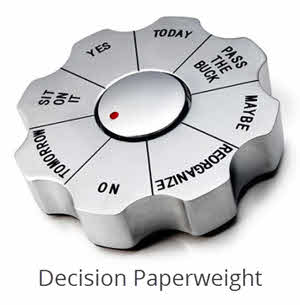
For some, gift giving is the merriest part of the holiday season. For others, it causes panic and dread.
Gift giving and receiving are both highly emotional processes, which is why there is so much pressure to give employees, managers, clients, and peers the right gifts. Stress builds over whether it is appropriate to give a gift in the first place, what to give, and how much to spend. But despite this worry, business professionals continue to exchange gifts and deliver gifts to clients year after year because the benefits of doing so far outweigh their internal angst.
Internally, gifting is a way to recognize and motivate employees, which improves company-wide morale. Gifts also provide an easy avenue for supplementing traditional compensation and demonstrate employee value. Depending on the value and nature of the gift, it may also be a tax-deductible expense for managers.
Externally, gifts strengthen client relationships and encourage referrals, especially around the holidays when people are experiencing the goodwill of the season. They also serve to establish the giving company as generous and caring, improving brand perception with current and future B2B customers. Gifts also improve customer loyalty, which can significantly impact profitability (a 5% increase in retention can lead to a 25-95% increase in profits. Furthermore, as yearly budgets are developed, year-end gifts can encourage additional spending as well.
Should You Give a Gift?
Typically, worry over whether to give a gift arises when someone feels obligated to do so but does not have a decent gift idea. Giving the wrong gift can be interpreted as insincere at best and offensive at worst, which is a bigger faux pas than not giving a gift at all. Furthermore, giving an ordinary gift that people expect is unlikely to turn many heads, which means it may just be a waste of budget.
The solution, obviously, is to give a gift that will wow recipients to produce holiday cheer and joy. As Pam Neely explains, “Every so often, do something nice – and unexpected. Surprise gifts often mean more to us than gifts we think we’ve earned. So, where you can, try to surprise your customers. This may require sitting down with finance and customer service to figure out where and how you can do small but meaningful things for your customers.”
No matter what you choose to do, follow the cardinal rule of gift giving: never re-gift. It can be tempting to repurpose unwanted items from the over-the-top basket your company received from another company, but this practice is especially tacky in the professional world. Furthermore, if you get caught, it will reverse any goodwill your company was trying to establish and do brand damage in the process.
How Much Should You Spend?
The haziest part of gift giving is determining how much to spend.
Inevitable budget constraints restrict how much you can afford to spend per person or per client, but underspending can be just as offensive as choosing to forgo gift giving. If the goal of holiday gift giving is to express genuine appreciation and gratitude, giving an underwhelming gift can be taken as an insincere expression of thanks. Overspending can be poorly received as well, making clients feel obligated to renew contracts and solidify exclusivity agreements.
While giving pricier gifts to better clients using a tiered approach is a sensible way to manage your discretionary budget, employee gift giving should be equitable. Inconsistent giving among employees may be misinterpreted as preferential treatment, causing animosity, and reducing employee morale.
In some industries, gift caps limit the value of gifts that individuals or companies can receive. For this reason, it is crucial to research these limitations before gifting anything.
You and your colleagues might prefer taking up a collection to purchase one nice gift rather than each coworker giving something small. If you choose the collection method, offer a suggested range and be sensitive to those who are unable to give.
What Should You Get?
They simplest way to search for a gift may be to pull up an Amazon app on your iPhone (or on your Android). If you do use your Amazon app, search 'personalized gifts' in the search box and consider something less generic.
You may not find gifts for the executive who are not not easily impressed on Amazon. Here are a few other options:
 Personalization Mall offers personalized gifts which can be appropriate while showing appreciation. You will find gifts such as the Personalized Executive Candy Dispenser for candy, snacks and much more.
Personalization Mall offers personalized gifts which can be appropriate while showing appreciation. You will find gifts such as the Personalized Executive Candy Dispenser for candy, snacks and much more.
For creative gifts on a budget, The Grommet offers a wide array of unique gifts and probably best for those people you know better. Their “browse by collection” feature gives you the option to put together a clever box of themed gifts around tech, travel, fitness, and many more topics that will appeal to business professionals across many industries.
A popular source of more typical business gifts is UncommonGoods, where you can get kitschy desk trinkets and other gifts that office workers will find entertaining and inspirational.

For more ideas, Entrepreneur has curated a list of gift ideas for business professionals in time for this holiday shopping season.
Personalized gifts will always be better received, which means that dedicating the effort needed to find or create a customized gift is always a beneficial investment. Regardless of what you choose to give as a gift, always include a handwritten note. Taking the time to write something sincere is a timeless way of showing that you genuinely care.
When Should You Deliver Gifts?
After concluding that you should get a gift, determining how much you can budget, and selecting the right item for the recipient, delivering the gift at the right time is the last step in the process.
Your first consideration should be to make sure employees are in the office. Planning to present or deliver gifts when offices are closed, or employees have already left on holiday vacations can ruin the experience (especially if gifts are perishable or time-sensitive).
Secondly, you need to be sensitive to various religious beliefs. Timing gifts in conjunction with Christmas can be off-putting to professionals who celebrate other holidays or whose religious beliefs follow a different calendar. Since most businesses and employees celebrate the New Year, giving gifts at the end of the current calendar year or the beginning of the following year provides non-religious way to celebrate with gifts.
If you have given gifts to employees or clients previously, following the same schedule helps to establish a reassuring predictability. Some organizations select an arbitrary date (for instance, the second Monday in December), and adhere to it each year to give recipients something exciting to look forward to as the holidays approach.
Make someone feel appreciated this holiday season by giving the perfect gift. Your gift will matter more than you realize.
